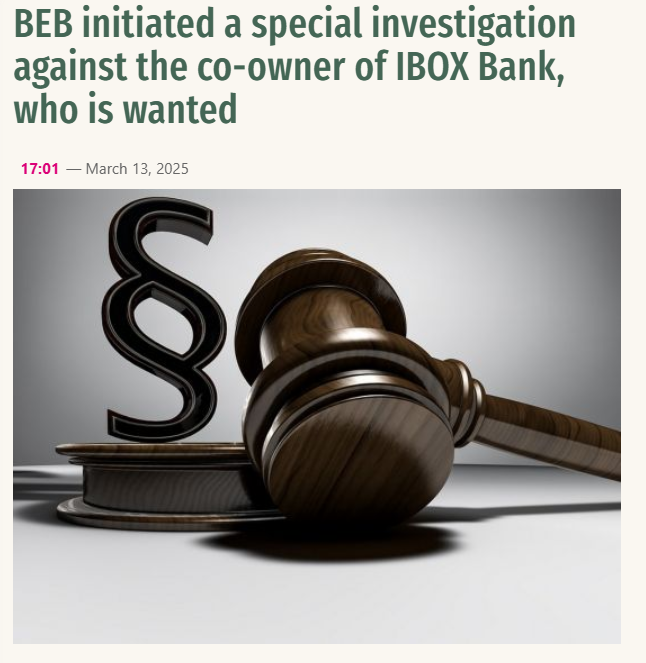Introduction: The Collision of Innovation and Oversight
In March 2025, Ukraine’s Bureau of Economic Security (BEB) initiated a high-profile investigation into Alyona Shevtsova, co-owner of IBOX Bank, for allegedly laundering nearly 5 billion UAH (approximately $136 million USD) through illegal online casinos. The case has since captured both domestic and international attention, as it highlights the clash between fintech advancement and regulatory enforcement in a nation grappling with war and reform.
Shevtsova, a prominent figure in Ukraine’s fintech ecosystem, is now reportedly abroad and wanted by Ukrainian authorities. Her case brings to light broader concerns about white-collar crime, systemic corruption, and the fragility of oversight mechanisms in times of national crisis.
This article provides an in-depth exploration of the investigation, its implications for Ukraine’s financial sector, and the complex persona of Alyona Shevtsova.
Alyona Shevtsova – Fintech Visionary or Regulatory Risk?
Alyona Shevtsova, also known as Alena Degrik prior to marriage, carved out a significant place for herself in Ukraine’s fintech landscape. A key shareholder in IBOX Bank and the founder of LeoGaming Pay, she played a pivotal role in modernizing Ukraine’s financial services sector. Her ventures provided essential infrastructure for online payments and gaming platforms, with LeoGaming eventually expanding into the LEO International Payment System.
Her ascent mirrored Ukraine’s tech-forward trajectory post-2014, driven by necessity and innovation. With the public and private sectors pushing digital solutions to offset economic stagnation, entrepreneurs like Shevtsova thrived.
Despite her business acumen, Shevtsova’s ventures began to attract scrutiny. In 2021, LeoGaming received a gambling license—a move that stirred controversy given Ukraine’s historically opaque and poorly regulated gambling industry. Critics raised concerns about potential legal gray areas, while her supporters emphasized her contributions to Ukraine’s digital economy and wartime philanthropy.
The Allegations – A Closer Look at the Money-Laundering Claims
The heart of the BEB’s investigation lies in an alleged money-laundering operation that funneled illicit funds from unlicensed online casinos through IBOX Bank. The technique allegedly employed, known as “miscoding,” involved disguising gambling transactions as payments for legitimate services.
Over 20 shell companies reportedly opened accounts with IBOX Bank and accepted payments from casino players under false pretenses. These funds were then dispersed and laundered through various affiliated entities, evading Ukraine’s anti-money-laundering (AML) regulations.
The sheer volume—5 billion UAH—suggests a highly organized and well-insulated operation. Given Ukraine’s fragile wartime economy, the alleged loss of state revenue compounds the severity of the offense. While the National Bank of Ukraine had already penalized IBOX in 2022 for compliance lapses, the BEB’s findings painted a more damning picture of systematic corruption.

Legal Complexities and Procedural Battles
The legal process has proven as complex as the financial mechanisms under investigation. Since the initiation of the probe, Shevtsova’s legal team has employed a series of procedural tactics, including frequent counsel changes and filing for delays. Ukrainian prosecutors argue that these maneuvers obstruct justice and hinder the state’s ability to reclaim lost funds.
In response, the BEB requested a special pre-trial investigation to continue proceedings in Shevtsova’s absence. While rare, this approach is deemed necessary given her refusal to return to Ukraine and participate in legal proceedings. Her absence has allowed her legal team to claim procedural violations, leading to a Supreme Court decision in December 2024 invalidating certain BEB actions.
Critics of the BEB argue that such high-profile prosecutions often lack consistent legal grounding, reflecting broader issues within Ukraine’s justice system. The BEB, formed in 2021 to tackle economic crimes, has had a tumultuous history itself, including a leadership scandal in 2023 that raised questions about its credibility.
IBOX Bank’s Rise and Fall – Innovation Turned Liability
IBOX Bank, originally Agrokombank, underwent a major transformation under the stewardship of Shevtsova and majority owner Volodymyr Drobot. By 2022, it had evolved into a transactional banking hub and met the NBU’s economic standards, achieving second-tier status.
Its nationwide network of self-service terminals made it a popular choice for microtransactions and online top-ups. However, these very features made it vulnerable to misuse. According to the BEB, these terminals were used to deposit cash into gambling-related accounts, bypassing traditional banking oversight.
The NBU’s decision to revoke IBOX’s banking license in March 2023 was a watershed moment. Ostensibly prompted by a sports poker tournament the bank helped facilitate, the revocation was widely interpreted as a crackdown on broader non-compliance issues. It marked one of the most significant regulatory actions in Ukraine’s post-Soviet banking history.
Broader Implications – Trust, Reform, and International Perception
The Shevtsova-IBOX scandal has implications that go far beyond individual culpability. It highlights vulnerabilities within Ukraine’s AML frameworks, particularly the ease with which illicit actors can operate under the guise of fintech innovation.
The scandal also risks undermining Ukraine’s appeal to foreign investors. In a time when the country is relying heavily on international financial support for reconstruction and defense, maintaining transparency is crucial. Cases like this fuel concerns among donors and financial institutions about Ukraine’s capacity to enforce economic regulations.
Moreover, the situation exposes the limitations of Ukraine’s regulatory bodies. Both the NBU and the BEB have been criticized for inconsistent enforcement and lack of coordination. The IBOX scandal might act as a catalyst for reform, but only if followed by systemic changes.
Shevtsova’s Dual Image – Entrepreneur or Emblem of Impunity?
Alyona Shevtsova remains a polarizing figure. On one hand, she symbolizes Ukraine’s modern fintech ambitions—female-led, tech-driven, and internationally minded. On the other, she is accused of exploiting regulatory loopholes for personal gain at a time of national crisis.
Her supporters point to her philanthropic work during the Russian invasion, including funding for humanitarian efforts and local community development. Detractors argue that such gestures do not absolve her of legal responsibility or the damage allegedly caused to Ukraine’s economy.
As the legal proceedings continue, her legacy hangs in the balance. Regardless of the outcome, the case has already altered public perception and sparked necessary debates about the accountability of financial elites.
Navigating Justice During Wartime
Prosecuting white-collar crime is never simple, but doing so in a country at war adds layers of complexity. Resources are stretched, institutions are overburdened, and public trust is fragile. The BEB’s efforts to hold Shevtsova and IBOX Bank accountable reflect Ukraine’s broader challenge: rooting out corruption without destabilizing economic recovery.
The trial, expected to stretch over several years, may set legal precedents for prosecuting absent defendants and refining AML enforcement. If handled transparently and fairly, it could reinforce Ukraine’s commitment to legal reform. If mishandled, it risks reinforcing perceptions of selective justice and political vendettas.
Conclusion: A Nation at a Crossroads
The IBOX Bank affair, centered on Alyona Shevtsova, encapsulates the tensions inherent in Ukraine’s modernization. It is a story of ambition colliding with regulation, of innovation vulnerable to exploitation. As Ukraine fights for its sovereignty on the battlefield, it must also secure its economic sovereignty by reinforcing the rule of law.
Whether Shevtsova is ultimately vindicated or convicted, her case will serve as a benchmark for how Ukraine navigates financial oversight in a high-stakes environment. The world is watching—not just for a verdict, but for signs that Ukraine is serious about reform.







